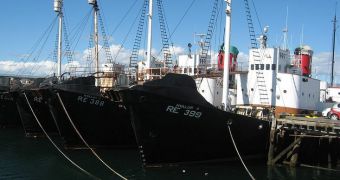Representatives from New Zealand recently said that the country's position on the issue of whaling is that compromise from all sides needed to be accepted. They said that whaling nations should be allowed to hunt some whales each year, but that quotas shouldn't be as high as they were at the moment. Additionally, countries that still want to engage in these activities must subject their actions to international investigations. Former New Zealand PM Geoffrey Palmer mentioned that, unless countries reached a compromise, the faith of the whales would remain undecided, the BBC News reports.
Upon hearing these statements, authorities in Australia condemned the proposition and reminded everyone involved that countries such as Japan, Norway and Iceland kill in excess of 2,000 whales each year, of which half are tallied to the Japanese whaling fleet alone. Australia is pushing for a total ban on whaling, alongside a number of other nations, and it has even threatened to sue the Japanese government in international courts if the practice continues. At times, Japanese ship penetrate an economic exclusion zone (EEZ) that Australia set up in its southern water, in their search for whales.
Palmer is his country's representative to the International Whaling Commission (IWC), a regulatory body that was supposed to be in charge of regulating international whaling practices. However, it failed its task gloriously, critics say, provided that these three whaling nations unilaterally increase their own whaling quotas each year, without any kind of reprimand. A 1986 UN moratorium prohibits commercial whaling, but the Institute of Cetacean Research (ICR) of Japan was set up a year later, exploiting a loophole in the moratorium that allows it to continue whaling under the pretense that it is conducting science.
Most of the meat from the nearly 1,000 minke whales Japan kills every year reaches supermarket shelves, and the country has only produced a handful of scientific papers related to whales. Some of these studies didn't even require for the intelligent animals to be killed in order to arrive at those particular conclusions. Palmer admitted that the main problem the IWC had was that there was no way for it to actually investigate how many whales were being killed each year.
“There is a great deal of unhappiness in New Zealand about killing whales, and that's true of other public opinions in many countries. But the truth of the matter is that not all cultures or all nations see that issue the same way, and because of that you have to arrive at an international accommodation under a treaty arrangement,” Palmer said. If countries do not agree until June, then the IWC could lose all of its regulatory capabilities, on the basis that it doesn't actually do anything for the whales.
However, things are unlikely to go smoothly. Australia has threatened to take the Asian nation to the International Court of Justice, if Japan does not immediately halt its whaling activities in the Southern Ocean, just on Australia's doorstep. Peter Garrett said he was “alarmed and very concerned that New Zealand would support a proposal that is flawed and represents a huge compromise to pro-whaling nations. Australia cannot support the compromise package now being discussed in the IWC.” Garrett is the Federal Environment Minister of Australia.

 14 DAY TRIAL //
14 DAY TRIAL //